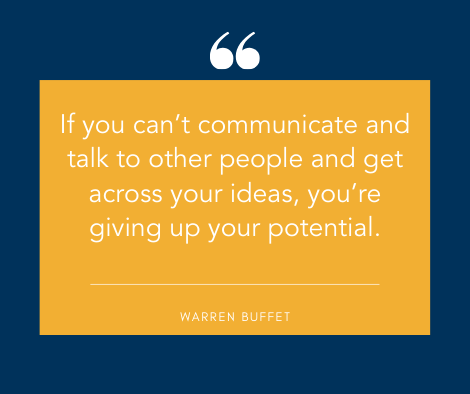Business Etiquette
Professionalism is about more than just dressing appropriately or saying the correct words; it is a manner of social graces that defines you as a professional. Business etiquette is a set of established rules that professionals from all backgrounds agree upon that forms a refined person. Mastering business etiquette ensures that you are able to go into any space with bravado, speak with clarity and assurance, and demonstrate respect for the people and environments around you.
- Rules of Speech
-

- Speak clearly and articulate your words. Avoid slurred speech, distracting accents and dialect, and take care to use crisp, clean speech.
- If necessary, practice proper speech at home before entering a professional space.
- Use proper English. Avoid profanity, slang, and colloquial expressions in all interactions—interpersonal or electronic.
- Example: Instead of, “What’s up?” say, “Hello. It is nice to meet you.”
- Although large words may sound impressive, ensure that you use the correct words before you speak. Others will notice if you use the wrong word, and this will lessen your trustworthiness.
- Speak at a steady and smooth pace. Talking too quickly communicates nerves while talking too slowly communicates unintelligence.
- Think before you speak. Do not speak impulsively but ensure that the words you say accurately reflect the message you intend to communicate.
- Decide how to speak based on the environment. Adjust your volume in various environments accordingly.
- Speak clearly and articulate your words. Avoid slurred speech, distracting accents and dialect, and take care to use crisp, clean speech.
- Rules of Space
-
“Respect is a two-way street. If you want to get it, you’ve got to give it.”—R.G. Risch
Always stand about two to three feet away from people. This shows respect for the personal space of others and ensures that all parties are comfortable.
Appropriate touch for work is a handshake. Avoid hugs, shoulder pats, close standing, “friendly” punches, and private touches.Do not flirt or initiate romance with coworkers. This creates an uncomfortable workplace environment and may be grounds for dismissal.
Do not touch things that belong to others. Even if it seems like a simple item, always ask before you borrow or touch.
Furthermore, do not walk into the offices or personal areas of others without obtaining permission first.
Be mindful of body language. Be open and friendly but maintain professional distance.
- Rules of Communication
-
“The most important thing in communication is to hear what isn’t being said.”—Peter Drucker
Be respectful of the schedules and times of others.
Arrive on time and be enthusiastic when meeting new people and interacting with associates.
If you are late, have a valid reason (sickness, emergency, something not caused as a result of poor planning) and communicate that to the appropriate people as quickly as possible.
Always maintain this courtesy: do not “pop in” for a meeting or surprise someone in the office. Ask and make an appointment beforehand.
Use complete sentences and proper English. This communicates intelligence and competence. Avoid instant-messaging language and poor grammar.
When sending emails, keep the communication clear and get to the point quickly. If you need to elaborate on anything, set up a time to discuss on the phone or in person.Do not “reply all” unless necessary.
If speaking on the phone, use proper English and common courtesy.
Have a professional sounding outgoing message for your voicemail.
If leaving a voicemail, leave your name, a brief message, and a call-back number.Example: “Hello, this is Jane Doe. I was calling to discuss the notes related to the last meeting and how we should proceed with the next steps. Please call back at 123-456-7890. Thank you for your time.”
Avoid discussing inappropriate topics. This includes, but is not limited to: sex, personal habits and preferences (not related to work), religion, drugs, politics (unless job-related), health issues, workplace gossip, and family history.
Treat all work-related contacts with basic respect and courtesy. Even if you do not prefer an individual or group, treating them with kindness speaks highly of your ability to put the goals of a company before personal feelings.Furthermore, do not talk about others to coworkers and associates. Word of mouth travels quickly and can tarnish your reputation.
- Rules of Food
-
“Good manners will open doors that the best education cannot.”—Clarence Thomas
Follow protocol for good table manners. Do not place elbows on the table, talk with your mouth open, or reach for food that does not belong to you.
The person who initiated the meeting pays for the meal. Do not order anything expensive nor criticize the food and/or chosen location.
Follow the leader. If the host orders appetizers and dessert, do the same. This ensures that the host does not feel “alone” while eating.
If alcohol is served, do not become intoxicated. Not only will this destroy your reputation as a professional, but you may speak or behave in an embarrassing manner.Ask for a virgin beverage if others are drinking and you do not feel comfortable consuming alcohol.
Do not get a take-home box. This makes the host believe that you did not enjoy your food or that you ordered in excess.
Follow basic rules of professionalism for the duration of the meal. Make sure that you thank the host for the invitation and dining opportunity.